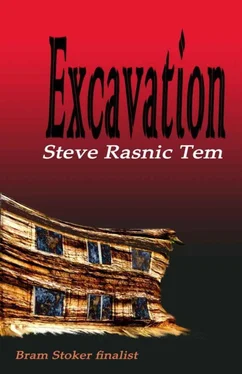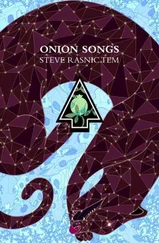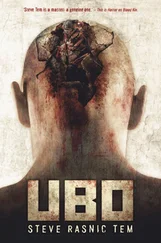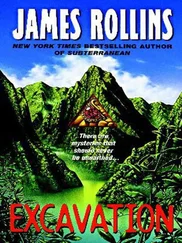Steve Tem - Excavation
Здесь есть возможность читать онлайн «Steve Tem - Excavation» весь текст электронной книги совершенно бесплатно (целиком полную версию без сокращений). В некоторых случаях можно слушать аудио, скачать через торрент в формате fb2 и присутствует краткое содержание. Год выпуска: 2010, ISBN: 2010, Издательство: Crossroad Press & Macabre Ink, Жанр: Ужасы и Мистика, на английском языке. Описание произведения, (предисловие) а так же отзывы посетителей доступны на портале библиотеки ЛибКат.
- Название:Excavation
- Автор:
- Издательство:Crossroad Press & Macabre Ink
- Жанр:
- Год:2010
- ISBN:978-1-452-38320-0
- Рейтинг книги:3 / 5. Голосов: 1
-
Избранное:Добавить в избранное
- Отзывы:
-
Ваша оценка:
- 60
- 1
- 2
- 3
- 4
- 5
Excavation: краткое содержание, описание и аннотация
Предлагаем к чтению аннотацию, описание, краткое содержание или предисловие (зависит от того, что написал сам автор книги «Excavation»). Если вы не нашли необходимую информацию о книге — напишите в комментариях, мы постараемся отыскать её.
Excavation — читать онлайн бесплатно полную книгу (весь текст) целиком
Ниже представлен текст книги, разбитый по страницам. Система сохранения места последней прочитанной страницы, позволяет с удобством читать онлайн бесплатно книгу «Excavation», без необходимости каждый раз заново искать на чём Вы остановились. Поставьте закладку, и сможете в любой момент перейти на страницу, на которой закончили чтение.
Интервал:
Закладка:
“I will.”
“And write.”
“That too.”
“I can’t manage long without you, you know. And that’s love, not dependence speaking.”
Reed gripped the phone more tightly. He couldn’t speak. He could tell she was aware of his discomfort, because suddenly the kids were on, both of them, giggling and asking him to bring back a souvenir for each of them and when was he going to be back because they missed him already.
“You’ll be back soon, I guess?” That was Michael, trying to act nonchalant. But Reed knew the boy still felt insecure; every time Reed or Carol went anywhere, Michael was sure they wouldn’t come back for him.
“You bet. I love you, Michael. Help your mother out now, okay?”
“Okay.” His son sounded much better now.
Reed talked to his children for a long time; he almost missed the plane back into his past.
Chapter 9
The town of Simpson Creeks did not awaken as most country hamlets do. It did not rise early, few residents had early morning chores, since farming had ceased to be a business and was more a pastime for retirees. Charlie Simpson was usually the first up, for the long ride into town to open up the store. The few remaining miners were next, but they didn’t have to report until eight. That left insects and small animals to greet the dawn, a few deer, and one bear.
Bear… yes, there’s bear out there… Charlie thought, and discovered that for the first time in his life he didn’t want to drive into work. In fact, he had the sudden impulse to crawl back into bed with a good bottle of whiskey and pull the covers up over his head. He couldn’t bear the thought of passing those woods—no telling what might walk… or swing or slither or fly out of there this morning. Just no telling.
But he’d been doing the same thing for years and he just couldn’t break the pattern today, not even for what had happened to him out in the woods. Whatever happened… he wondered if he would ever know for sure. He figured not; he didn’t even want to think about it.
Besides, his old hound Buck would be waiting for him, for food and water and companionship. Charlie figured there wasn’t a being alive who cared about Charlie more, or counted on him more, than Buck did. It made him grin just thinking about it. Now, wasn’t he getting to be the sentimental old fool? Mattie would rib him to death, if she were still alive. He pulled on his pants and shirt, fumbled with his shoelaces, and headed out to the pickup.
Happily, Charlie found the old truck fast starting that morning. He roared out of the driveway, hoping to get by those woods just as fast as he could.
Fog usually lay heavy in the valley until almost midmorning, when the sun finally reached over the top of the Big Andy Mountain and began to burn it out of the hollows in layers from the top down, revealing the landscape with no small amount of suspense, if you were driving those roads early in the morning, and if you were still sleepy.
The old timers said the fog was different since the mines came; the streams full of mine acid added an acrid steam to the mist. They didn’t like to be out in it; they swore it would scour your lungs, give you cancer. The land had changed drastically over the past fifty-odd years. Families who had moved away to Indiana or Illinois or Ohio found little they could recognize when they returned. The Big Andy had changed its profile; the bear’s head—a head-shaped outcropping on the north face—had disintegrated from the blasting when they blew out the last tunnels. The chimney formations on the east side were carved off during a stripping operation five years ago. If you looked at the base of the Big Andy you saw what your ancestors might have seen, but above eye level he was a butchered animal, his snout lolling into a landslide of tailings.
When the miners came out of their houses, they stepped carefully into the mist. It was as if Big Andy were dreaming, and they were stepping out into his dream. But something had turned bad in Big Andy’s dream, and the miners drove more slowly up to the main mine inside his severed neck. Something seemed slightly mad about the way Big Andy crouched beside the Simpson Creeks.
Between the mining and the flood there seemed to be little left of the forest that once blanketed the Big Andy and the slighter hills for miles around. Now it was more concentrated: the thicker, wilder areas had mostly been worked around as the mining operations spread. A lot of those areas were virtually impassable, and discomfiting in their liveliness. So much surrounding the town of Simpson Creeks was dead clay now; it accentuated your sense of being on a safe island in the wilderness. The woods were alive, almost obscene with life—crawling with greens and browns.
The forest floor could be alluring; more than one Simpson Creeks resident found himself wandering out where he had no business, just to feel what it was like, see what was there.
Charlie Simpson had spent a lot of time in those woods; as a boy they’d been his playground, his school, his library. And even in their changed, more threatening state, they held much meaning for him. Thoughts of those woods made a lush backdrop for more practical, day-to-day thinking.
But still, Charlie Simpson knew from his more youthful explorations here that the woods were teeming with life, rocks and rotted logs hiding unseen communities on their undersides, and miles of underground tunnels beneath that. A forest floor burning with thriving, agitated life.
There wasn’t much undergrowth in these woods; the odd mix of soil and decaying conifer needles made the land too acidic. Mostly herbs and wood ferns spread their leaves here over ground too cold for the more inviting plants found lower in the valley. Layer upon layer of rich humus—the partially rotted corpses of countless plants and animals—dissolving into the layers below, then the minerals, the weathered rock making more soil, then the bedrock, hard and unchanging, the stoic heart of Big Andy. Layer upon layer upon layer, and all of it unthinkably ancient strata.
From his pickup window Charlie could see the chipmunks scurrying on the embankments bordering the winding gravel road. The sight relaxed him some. Occasionally he would see one disappear and he would wonder if it had entered its underground home a yard beneath the surface. There would be a small central chamber with a bed of grass and leaves down there somewhere, with its own bathroom off a short passage leading even deeper. There might be countless tunnels radiating from the bed chamber like the legs on a fat spider. Thoughts of that busy underground life had made Charlie vaguely uneasy as a boy.
Small snakes were bursting out of their eggs hidden beneath rocks and logs out there, their untouched skin gleaming wet and bright. Infant mice were squirming in pockets within the loose soil. In decaying logs a madhouse reigned: millipedes and centipedes—their bites were toxic, he remembered painfully—wriggling through masses of pill bugs, oil beetles, abandoned snake skins, worms and salamanders, so thick you might think the log had ceased to be a home for them and become a thin armor their thick masses held together.
Charlie could remember as a boy jumping into the soil under those ancient trees as if he were playing on a featherbed. All that vegetable and mineral matter honeycombed with pockets of air, pushing back at him playfully, like one great teddy bear of a beast. At times the ground seemed strangely insubstantial, like the ground you walked on in dreams.
It had always seemed to Charlie that the links in the food chain were unusually close here, the dance of victim and predator so interwoven that one began to blur into the other. Roles were reversed or exchanged. One thing becoming another over and over again—all life was like that, Charlie guessed. It was kind of nice and kind of frightening at the same time. It made it easy to imagine everything becoming animate at one stage of existence—ancient trees shifting their roots in preparation for a stroll, or a patch of insects and moss flowing slowly over a rock like some undersea ray.
Читать дальшеИнтервал:
Закладка:
Похожие книги на «Excavation»
Представляем Вашему вниманию похожие книги на «Excavation» списком для выбора. Мы отобрали схожую по названию и смыслу литературу в надежде предоставить читателям больше вариантов отыскать новые, интересные, ещё непрочитанные произведения.
Обсуждение, отзывы о книге «Excavation» и просто собственные мнения читателей. Оставьте ваши комментарии, напишите, что Вы думаете о произведении, его смысле или главных героях. Укажите что конкретно понравилось, а что нет, и почему Вы так считаете.












